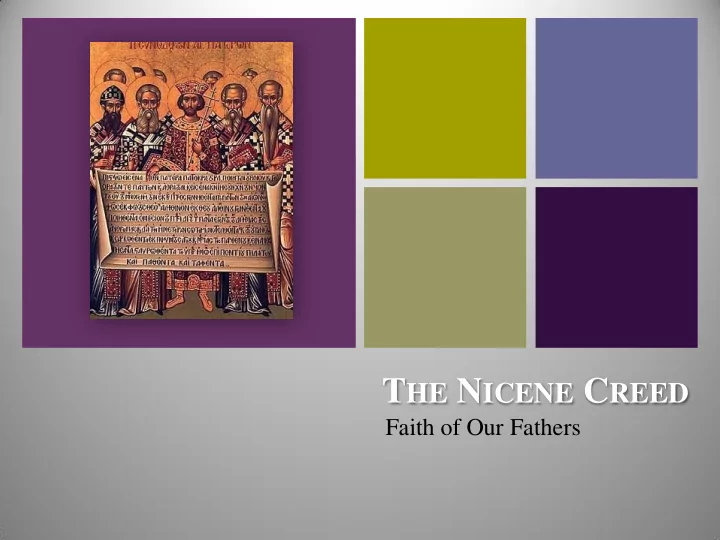

T HE N ICENE C REED Faith of Our Fathers
Definitions Creed Latin, credo, credere I believe, a form of belief Belief Biblical sense If you do not stand firm in faith, you shall not stand at all (Is 7.9) Rooted in personal encounter with God
Historical Considerations Apostle’s Creed From Baptismal celebrations (2 nd -3 rd cc.) Dialogue Triple renunciation Triple assent Credes? Credo! Triple immersion 3 rd c. expansions Christ Holy Spirit
East vs. West East Multiples Churches, multiple Creeds West Focus: facts of Salvation History Spread with Latin language Final form 9 th c. (Gaul) Differ on theological emphasis, not belief Apostolic ‘legend’: 5 th c.
The Nicene Creed
History Council of Nicaea (325 AD) Response to Arianism (Denial of Christ’s divinity; subordination to Father) Constantinople II (381) Refined articles on Christ Expounded on Holy Spirit
History (cont.) Necessity to define truth of Revelation Modifications: clarifications to avoid error Shifts notion/purpose of Creed Baptism/conversion orthodoxy Ensures deposit of Faith, communion
Structure and Content 4 parts: Father (origin) Son (history) Holy Spirit (agent) Church (consequence)
New Translation Better reflects Latin We I seen/unseen visible/invisible of one being consubstantial
The Creed in Liturgy 3 Creeds (Nicene, Apostles’, Athanasian) Eastern Churches: only Nicene Creed Roman Church Baptism: Apostles Eucharist: Nicene, Apostles’, Athanasian Nicene Creed only used in Mass Creed begins Missa Fidelium
Credo , I do Believe Original sense: Baptismal assent , not recitation of doctrine Signifies conversion Doesn’t require full understanding Credo ut intelligam Lord, I believe, help my unbelief (cf. Mk 9.24) Leads to desire for knowing, loving
The Nicene Creed A Gift to unpack over a lifetime of Faith
Question to ponder… What strikes you the most about the Nicene Creed? Why?
Recommend
More recommend